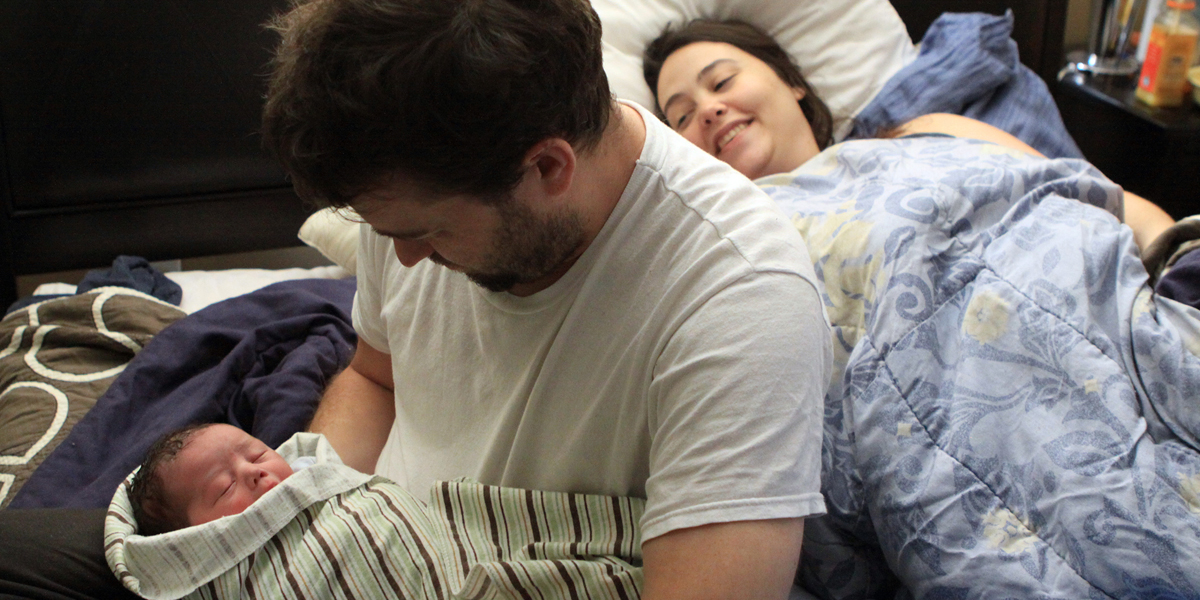Nearly a third of deliveries don’t go as planned, so two Parisian midwives share some advice on how to cope with the unexpected.
Lenten Campaign 2025
This content is free of charge, as are all our articles.
Support us with a donation that is tax-deductible and enable us to continue to reach millions of readers.
Often thought of as the most beautiful day of our lives, the day we give birth can actually turn out to be traumatic for some women. It’s the moment you get to finally meet your long-awaited bundle of joy face to face, but it’s also a physical and psychological ordeal. Although there are inevitably some moments that weren’t in your plan, the delivery can be very distressing if a member of the medical team inadvertently uses a poor choice of words when talking you through the process of childbirth, or makes a gesture that could be hurtful. In relatively rare and extreme cases of medical misconduct, you may even have to deal with “obstetric violence,” a formerly taboo subject now being revealed through the testaments of new mothers traumatized by a painfully mishandled birth.
There are a multitude of possible worrisome scenarios during childbirth that can be tricky to deal with, such as the use of a ventouse and/or forceps, hemorrhaging after birth, episiotomy, or an emergency c-section. However, with the right preparation, good communication with the maternity team, and the willingness to take care of ourselves at home, it is possible to manage and recuperate from a difficult birth.
It can help to keep the advice of Anna Roy and Caroline Sergent, midwives in Paris, in mind before, during, and after the arrival of your baby:
Before: Preparing yourself for the birth
Accepting the pain
Pain is part and parcel of giving birth, especially during contractions. “We should tell everybody that a contraction is painful!” states Sergent. “The delivery isn’t necessarily difficult, but there’s a high probability the future mom will feel pain at some stage or another.”

But it’s not in vain. Each contraction prepares the cervix a little more, and is therefore one more step towards the birth of the baby. Keeping this in mind, mental preparation is crucial for controlling the pain in order to concentrate on labor and the delivery itself.
Learn to control your body
During a first birth, it isn’t easy to understand fully what it will be like, and it is difficult to prepare for the unknown. The most important thing is to listen to your body and to understand it as well as possible so that you don’t become overwhelmed during the delivery.
“Relaxation therapy is a great option to manage your breathing better and to prepare yourself mentally to be in pain,” advises Sergent. “The brain and the body must be in harmony, right from the first few months of pregnancy. She must learn to focus on the arrival of the baby and on her breathing.” The father must also be mentally prepared, especially if he is going to be present in the delivery room; if his wife is in pain, he may be concerned, especially if he doesn’t know what to expect.
Prepare yourself for something difficult
Far from getting anxious and imaging the worst case scenarios before the birth, you should be as well-informed as possible so you don’t feel unsettled in any unforeseen circumstances. “It’s vital to prepare yourself for a complicated birth with a potential c-section, for the use of extra equipment, or for other unwanted scenarios; otherwise, you can experience disappointment and even greater trauma,” warns Roy. In the labor room, the team doesn’t always have time to explain things to the mother when a situation turns out to be more complicated. During the preparation, we must explain to both parents that the medical instruments will make a noise, that during a c-section it’s cold in the room and that the mother will have to cross her arms, etc.”

Providing this practical information, including details which could seem insignificant, but which could create a real emotional shock in a tense moment, can really help the new mom. The father should also be as informed as possible so he can provide adequate support during each phase of the birth. The spouses should discuss possible scenarios ahead of time, and make plans so that the father can be prepared to deal with medical contingencies as previously agreed between them; this will give the mother greater peace of mind.
During: Stay calm during the birth
Put things in perspective
Even if everything isn’t going according to plan, the mom’s concentration must remain focused on the baby. As in any physical ordeal, our mental state plays a huge part. “It’s important to remain calm and not become overwhelmed by stress,” advises Sergent. “Put things into perspective by thinking of your beautiful baby who will soon be in your arms.” Childbirth is a moment of profound physical connection and interaction between mother and child; the mother shouldn’t need to pay attention to anything going on around her.
After: Getting over a difficult birth
Have a post-birth debriefing
“In cases where there have been complications, the mother and father should not leave the maternity ward without having a follow-up appointment with a doctor or a midwife,” stresses Roy. “They will go over the delivery in detail, discussing all the different elements. If nobody is available before you leave, schedule an appointment for within a few days after the birth, with a medical professional who can come to the home or a psychologist specialized in perinatal care, depending on your trauma.”

Too often, new moms are put in a mostly passive role during delivery, and they feel they have merely endured it, instead of being the protagonist. You must deal with any questions as soon as possible, and leave the hospital without any resentment due to doubts or misunderstandings. “Straight from the labor room, the parents must have a ‘debriefing’ with the medical team about what happened,” recommends Sergent. “If the mother has suffered or doesn’t understand why certain things were done, that must be explained and cleared up.”
“And this need to clear things up should be fulfilled before returning back home, where the new mother will have to deal with a baby who doesn’t sleep through the night, and where feelings of overwhelming fatigue set in. It’s also a good idea to talk with your husband, who may have experienced the birth in a different manner.”
Pay attention to your diet
Following a difficult birth, the body is lacking nutrients. It needs certain vitamins and trace elements to recover properly. “Eating well is essential to recover your reserves,” explains Roy. “Eating red meat or spinach is beneficial for iron deficiencies. Also think about legumes (green beans, lentils, dried peas) and calcium (cheese, dark leafy greens, sardines, etc.) for breastfeeding.”
Avoid skipping meals and eat good quality products. Don’t forget those favorite dishes for when you need a little pleasure!
Be well supported and get help
Very few women go through pregnancy physically unscathed: from stretchmarks to slightly bigger feet — yes, you can gain a half size! — we end up with a lasting “souvenir.” When there are complications (use of instruments, emergency c-section or others) the postnatal period is often tricky, and it’s good to not go through this time alone. Your husband’s support and understanding is vital.

“The postpartum period is rarely brought up, even though it is the most complicated period for women to overcome,” states Roy. Bleeding, hemorrhoids, genital pain, and bladder weakness are among a variety of problems that may follow a birth, and generally last between 6-8 weeks. “The new mom must get help from a willing and understanding circle of friends and family,” advises the midwife. “She needs to be protected and should concentrate purely on the needs of her baby.”
Taking care of your body
“As with any physical ordeal, giving birth necessitates a postnatal follow-up,” Sergent points out. “An osteopath can realign the pelvis if it has shifted from position. New moms can restarting physical activities once the doctor has given the all-clear. Swimming, for example, or another gentle sport, is great once you’ve returned home. And once the baby is big enough, it can become an activity to do together!”
While focusing on her newborn, mom often forgets to look after herself. Yet, it’s crucial for her to stay in good health and ready to look after her baby. “While the baby has all its mother’s attention, the mom often forgets to look after herself—for example, not tending to any incisions she might have,” notes Roy. “A newborn doesn’t need a daily bath; but the mother does! We must put things in perspective concerning the appropriate baby care.” It’s important that she let her needs be known to her husband, her own mother, and/or other family and friends who may be helping her through this period. Even if the baby cries when away from mom’s loving arms, it will do dad or the grandparents a world of good to cradle the babe in their arms while the mother bathes, eats, or attends to other essentials of self-care.
Sleep as much as possible
Besides taking care of herself and being given followup care by a medical professional, a new mother must be sure to get enough sleep; this is essential for getting over a difficult birth. “A lack of sleep can make us unbalanced, depressed, and bad tempered,” warns Roy. “Restorative sleep is essential for getting back to full health as quickly as possible.”

Easier said than done with a newborn in tow? First of all, at any moment of the day or night, you can make the most of your baby’s sleep to catch up on your own, even if it’s just for a few minutes. The washing up or clearing away can wait! Plus, you didn’t get into this alone; the father has just as much responsibility as you for the baby’s care. If he isn’t always able to be at home when you need him, don’t hesitate to ask a close and capable friend to look after the baby while you take a little nap. And better still, especially if your baby is particularly fussy, you could ask your spouse or friend to take a walk around the block with the baby so you can switch off.
Be patient: things will eventually become easier
“The body takes time to get over the emotions of giving birth,” Roy reminds us. In years gone by, a religious ceremony called “churching” marked the mother’s return to church after 40 days. There was a practical side to that tradition; it meant that the mother didn’t have to leave the house and had time to rest. In other countries, such as Canada, it is unthinkable to see new moms working or welcoming people at home. Everything is done to preserve and assure some rest after the birth.”

This cocooning is necessary to get back to normal. The body needs time to recover and can’t just snap back into shape. Instead of hopping around with impatience, try using this time to create a close bond with your baby. Although it is hard for many women to actually have prolonged maternity leave, if you do have to go back to work sooner than you’d like, make sure that your free time is devoted to your new family; friends and other family members can wait a while.

Read more:
Here’s what no one tells you when you’re about to give birth …

Read more:
How nearly dying in childbirth changed my view of motherhood








